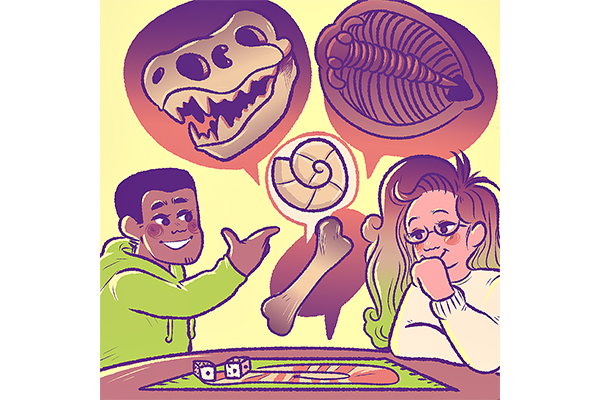Two UT scientists developed a game of chance to help students understand taphonomy, or how fossils are formed, in a classroom setting.
UT alumna Anna Weiss and Rowan Martindale, an assistant professor in the department of geological sciences, created “Taphonomy: Dead and Fossilized.” Weiss, who was Martindale’s teaching assistant for the Life Through Time course in spring 2018, said the topic of taphonomy is complex, and developing a board game would make it more engaging for students.
“There’s a really specific, random set of factors that have to happen in order for a fossilization to occur and then for the fossil to be found,” Weiss said. “(The game) mimics the chance aspect of it and the inherent randomness that goes into (something) eventually becoming a fossil.”
In the game, players are paleontologists who travel through time and find fossils. Over 700 students at 20 different United States universities, including UT, have played the game, Martindale said. She said one of the main goals of the game is accessibility, so there is a free printout version available on the Texas Data Repository website.
“As long as you can access a printer and some cardboard, you could make the game yourself,” Martindale said. “The idea was if you’re stuck in the middle of nowhere and have no teaching budget … the students can still learn the same material they would in a wealthy institution.”
Martindale said they developed the game to not only teach students about taphonomy, but also to provide a lab activity that students would have fun participating in.
“We tried to make the game as interesting as possible while still having a degree of scientific accuracy,” Martindale said. “The act of playing the game helps you learn the material.”
Weiss said they are also developing a Spanish language version and working to expand the game to high school classrooms. The game can be adapted to play with different age groups beyond high school and college, Martindale said.
“It could be a great resource for a lot of different people at various ages,” geology sophomore Michael Chiappone said. “It doesn’t necessarily get too complicated so that it’s harder for younger people to understand it, but it’s not so dumbed down that older people can’t enjoy the experience.”
Students who have played the game generally have a better understanding of the material than in previous classes, Martindale said.
“Students were actually getting what we wanted them to get out of it,” Weiss said. “They were intuitively understanding (the concepts), and that’s really important for actually learning.”
Weiss said they came up with the concept and rules for the game over the course of an afternoon and had people who were interested in board games test it out.
“It takes a topic that isn’t often talked about in general media dealing with paleontology and (makes) it really interesting using game mechanics,” said Chiappone, who played the game in the Life Through Time class. “It takes an educational risk that some professors don’t take. When you can get your students to be hands-on in really different ways … it can make a memorable experience.”















